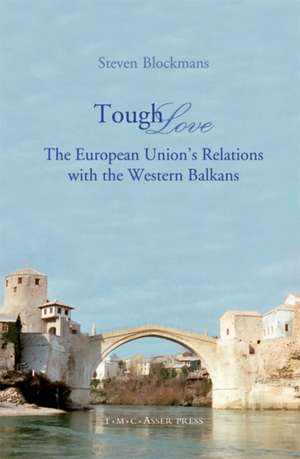Tough Love: The European Union’s Relations with the Western Balkans
Autor Steven Blockmansen Limba Engleză Hardback – 20 dec 2007
The European Union has come a long way in the Western Balkans in just a few years. Where, in the 1990s, the EU stood by and watched the Balkans burn, it was the US, within NATO, that acted decisively to stop the wars. In the aftermath of the Kosovo crisis, the Union finally found its voice to say no to new armed conflict in the heart of Europe. As part of the international presence in the region, the EU adopted sanctions, brokered political agreements, launched its first-ever police and military missions and directed economic, legal and administrative reforms to eradicate the roots of instability. Yet, despite the comprehensive nature of the Union’s actions, its strategies have been marked by confusion, its actions by concurrent or competing mandates of other international organisations.
As the Western Balkans still contain the possibility of a genuine security threat, there is a real imperative to move the region as a whole from the stage of international protectorates andweak states to the stage of accession to the euro-Atlantic organisations to which they aspire. The author argues that, under the leadership of the European Union, only a ‘tough love’ strategy, based on a firm but fair application of the conditionality principle, can lead to the integration of the Western Balkans into the European mainstream.
Dr. Steven Blockmans is senior research fellow in EU law and deputy head of research at the T.M.C. Asser Instituut, The Hague, The Netherlands.
As the Western Balkans still contain the possibility of a genuine security threat, there is a real imperative to move the region as a whole from the stage of international protectorates andweak states to the stage of accession to the euro-Atlantic organisations to which they aspire. The author argues that, under the leadership of the European Union, only a ‘tough love’ strategy, based on a firm but fair application of the conditionality principle, can lead to the integration of the Western Balkans into the European mainstream.
Dr. Steven Blockmans is senior research fellow in EU law and deputy head of research at the T.M.C. Asser Instituut, The Hague, The Netherlands.
Preț: 329.32 lei
Preț vechi: 742.11 lei
-56% Nou
Puncte Express: 494
Preț estimativ în valută:
63.02€ • 65.42$ • 52.55£
63.02€ • 65.42$ • 52.55£
Carte indisponibilă temporar
Doresc să fiu notificat când acest titlu va fi disponibil:
Se trimite...
Preluare comenzi: 021 569.72.76
Specificații
ISBN-13: 9789067042581
ISBN-10: 9067042587
Pagini: 400
Ilustrații: 400 p.
Greutate: 0.85 kg
Ediția:1st Edition.
Editura: T.M.C. Asser Press
Colecția T.M.C. Asser Press
Locul publicării:The Hague, Germany
ISBN-10: 9067042587
Pagini: 400
Ilustrații: 400 p.
Greutate: 0.85 kg
Ediția:1st Edition.
Editura: T.M.C. Asser Press
Colecția T.M.C. Asser Press
Locul publicării:The Hague, Germany
Public țintă
ResearchCuprins
The European Union’S Roughest Neighbourhood.- Role and Impact of the UN, NATO, The OSCE and the COE: The Western Balkans Lost in the Alphabet Soup?.- The European Union’S Actions Towards The Socialist Federal Republic of Yugoslavia and its Successor States (1991–2001).- The Western Balkans as a Testing Ground For a Common Foreign and Security Policy.- The European Union’s Application of The Conditionality Principle to the Western Balkans.- Recommendations for Reinforcing the European Union’s Role in the Western Balkans.
Textul de pe ultima copertă
The European Union has come a long way in the Western Balkans in just a few years. Where, in the 1990s, the EU stood by and watched the Balkans burn, it was the US, within NATO, that acted decisively to stop the wars. In the aftermath of the Kosovo crisis, the Union finally found its voice to say no to new armed conflict in the heart of Europe. As part of the international presence in the region, the EU adopted sanctions, brokered political agreements, launched its first-ever police and military missions and directed economic, legal and administrative reforms to eradicate the roots of instability. Yet, despite the comprehensive nature of the Union’s actions, its strategies have been marked by confusion, its actions by concurrent or competing mandates of other international organisations.
As the Western Balkans still contain the possibility of a genuine security threat, there is a real imperative to move the region as a whole from the stage of international protectorates and weakstates to the stage of accession to the euro-Atlantic organisations to which they aspire. The author argues that, under the leadership of the European Union, only a ‘tough love’ strategy, based on a firm but fair application of the conditionality principle, can lead to the integration of the Western Balkans into the European mainstream.
Dr. Steven Blockmans is senior research fellow in EU law and deputy head of research at the T.M.C. Asser Instituut, The Hague, The Netherlands.
As the Western Balkans still contain the possibility of a genuine security threat, there is a real imperative to move the region as a whole from the stage of international protectorates and weakstates to the stage of accession to the euro-Atlantic organisations to which they aspire. The author argues that, under the leadership of the European Union, only a ‘tough love’ strategy, based on a firm but fair application of the conditionality principle, can lead to the integration of the Western Balkans into the European mainstream.
Dr. Steven Blockmans is senior research fellow in EU law and deputy head of research at the T.M.C. Asser Instituut, The Hague, The Netherlands.
